How To Report a Predictive Search Suggestion in Google
April 25, 2025 Uncategorized
In this article, we’ll explain how to report a predictive search suggested query to Google so you can take control of your online reputation.
When someone searches for your name or company online, Google’s autopopulated query suggestions — called predictive search — can influence their perception of you before they even click on a result. While predictive search functionality has some excellent uses, it can also include defamatory, misleading or out-of-date suggested search terms.
As a public figure, business owner or simply a member of the public, it’s important to know what the autocomplete feature is saying about you so you can take steps to protect your online reputation.
Today, we’ll explain how predictive search works and show you how to report a query that’s giving users the wrong impression.
At RemoveMugshots.com, our removal services will erase your online arrest records and mugshot images from the internet fast. Contact us today at 844-935-1118 to learn more.
What Is Predictive Search?
Predictive search, also called autocomplete, is a feature of the Google search engine that helps users find what they’re looking for faster.
As you type in a search query, Google’s predictive search technology auto-populates longer and alternative search terms beneath the search bar. This helps the user quickly select what they’re looking for or add context to their search query.
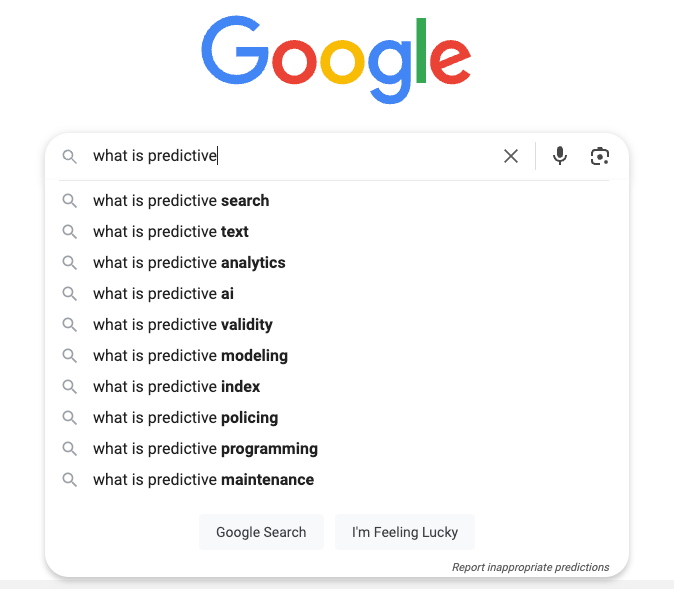
How does predictive search provide suggestions? They’re based on location data, popular queries, trending topics and user behavior.
While created to improve the ways users interact with Google, predictive search can cause reputational harm by displaying harmful or negative terms.
For example, if users type a business name, like Jones and Co., and there’s a suggested query of “Jones and Co. lawsuit” or “Jones and Co. scandal,” the person may assume the company has a lawsuit or scandal without finding out any other information.
Why Would You Want To Report a Predictive Search Suggestion?

While Google’s predictive search helps users speed up the research process and find what they’re looking for faster, it can cause damage to a business’ or an individual’s online reputation in some cases.
For example, if you search for a person’s name and something like “criminal record” populates underneath, this can lead the user to think that the person has a criminal record — even if they don’t.
Other negative suggested search terms may include words like:
- Divorce
- Fraud
- Lawsuit
- Scam
- Warrant
Even the suggestion of something like fraud or an arrest warrant can ruin a person’s reputation, raise doubts about a business, and drive friends, employers, coworkers and customers away.
Four Reasons To Report Predictive Search Phrases

- Inaccurate Timeliness: The query refers to something that happened in the past, like a lawsuit that’s been settled for years, or inaccurately describes an event. For example, “Jones and Co. lawsuit,” even if the lawsuit was dismissed 3 years ago.
- Defamatory or Harmful: The query is unnecessarily defamatory or harmful because there’s no truthful basis for the accusation. For example, “Dr. Jones malpractice,” even if the doctor has never had a malpractice case.
- Conspiracy or Misinformation: Some sites will spread misinformation for the purpose of getting more clicks or ruining someone’s personal or business reputation. For example, a query like “Medical Innovations hoax” may only be based on assumptions and rumors.
- Sensitive or Private Issues: At times, queries may reveal private information that the person would never want strangers to find out, such as “John Doe anxiety disorder.”
The removal experts at RemoveMugshots.com will analyze search results to find and remove your personal information and mugshots online. Call us at 844-935-1118 for more information.
Google’s Autocomplete Policies

Like other Google Search policies, there are guidelines for what should and should not show up in autocomplete. Autocomplete suggestions that are in violation of Google policies include the following types of content:
- Dangerous content
- Gore
- Harassment
- Hateful content
- Profanity and vulgar language
- Sexually explicit content
- Terrorism
- Violence
Moreover, there are specific rules for health- and election-related autocomplete suggestions, as well as sensitive information about individuals.
- Election-Related Content: Autocomplete cannot contain election predictions that take a stance for or against a political figure or party. Predictive search also can’t make a claim about the electoral process’ integrity.
- Health-Related Content: Search suggestions cannot make claims that could be medically hazardous.
- Sensitive Personal Information: According to Google, “We don’t allow predictions that associate potentially disparaging or sensitive terms with named individuals.” This includes search suggestions related to bullying, harassment, threats and sexualization.
Furthermore, Google doesn’t allow its predictive search engine to expose personal information that could cause the above offenses, along with financial fraud or identity theft.
Predictive Search and Online Reputation Management

We live in a digital-first world, and your online presence, or the digital presence of your brand, is the first impression people get of you. That goes for anyone who may search for you online, including clients, employers, family members and romantic partners.
Both relevant results and misleading predictive search results can have consequences for your credibility, trustworthiness and the opportunities you get. Managing your reputation online is now just as important as managing it offline.
4 Ways Predictive Search Results Impact Your Online Reputation
- They Influence First Impressions: Query suggestions may shape the initial perception a user makes about your business or you as a person.
- Negative Content Becomes More Visible: If you have negative content online, like a mugshot or an unflattering news article about you, having a related term autopopulate in Google will only make that content more visible.
- Positive Content Is Amplified: Similar to the above point, positive queries about you may also show in the Google autocomplete field, which can boost your reputation rather than damage it.
- They Help You Shape a Narrative: By using SEO strategies and submitting removal requests, you can influence which content Google shows users about you.
Do you need help removing your arrest records, mugshots or police records from search results? Get a free mugshot removal analysis today and sign up for a consultation with an expert. Learn more here.
How To Report Autocomplete Predictions
If you feel that a suggestion from Google’s predictive search feature violates the company’s policies, you can report the prediction. Here’s how to report a prediction using your computer.
1. Go to Google.
Using a browser on your computer, go to the Google homepage.
2. Enter your search query.
In the search bar, enter the online search query that brings up the suggestion you want removed.
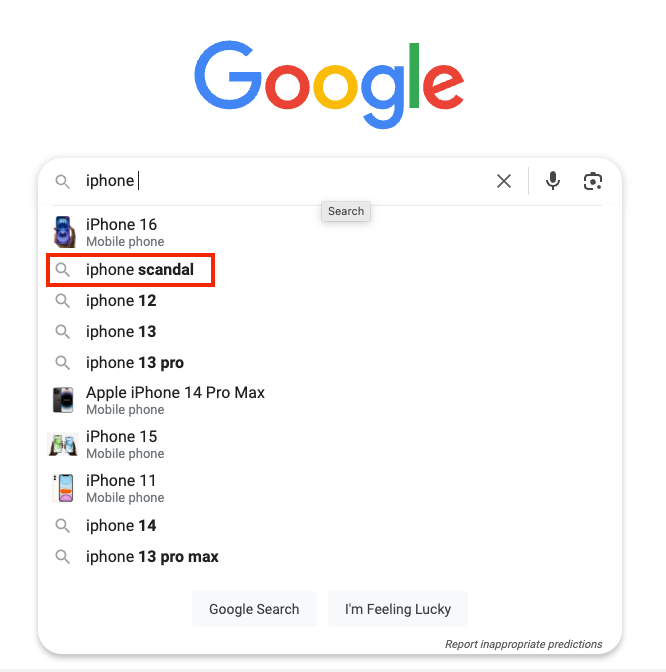
3. Open the search results for that suggestion.
Click the suggestion that you want removed to bring up the search results page for that keyword.
4. Click the link to make a report.
Put your cursor in the search bar and click it to bring the autocomplete window up again. At the bottom of the autocomplete window, click the link on the right that says Report Inappropriate Predictions.

5. Select the correct autocomplete result.
Click the result that you want to report.
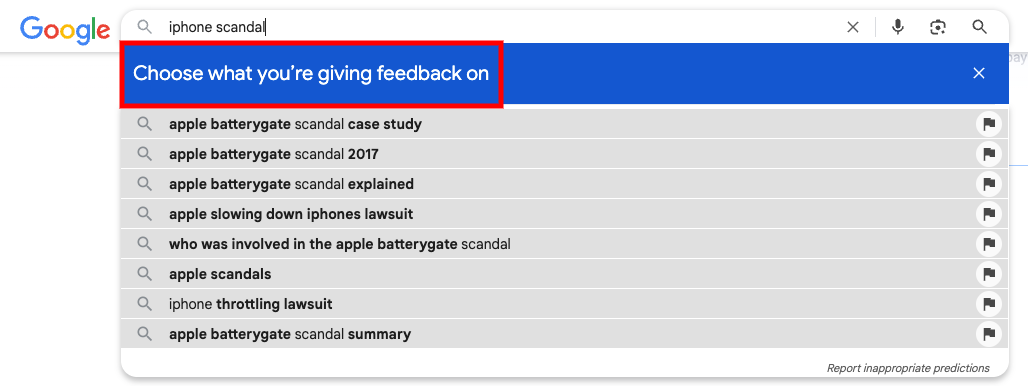
6. Choose the reason for your feedback.
Select the option that most closely matches your reason for reporting the result.
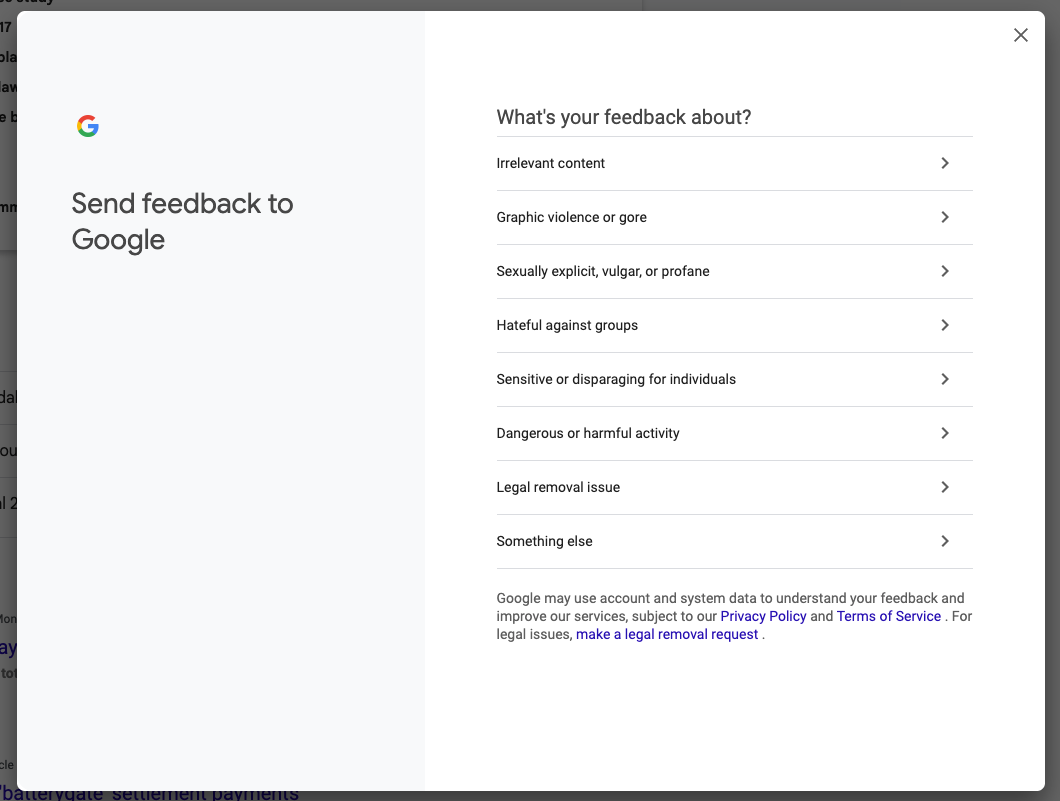
7. Add details about the suggestion.
You have the option to include information about why you want the suggestion removed. It’s also helpful to include a screenshot to help the team assess your request. When you’re done, click the Submit button.
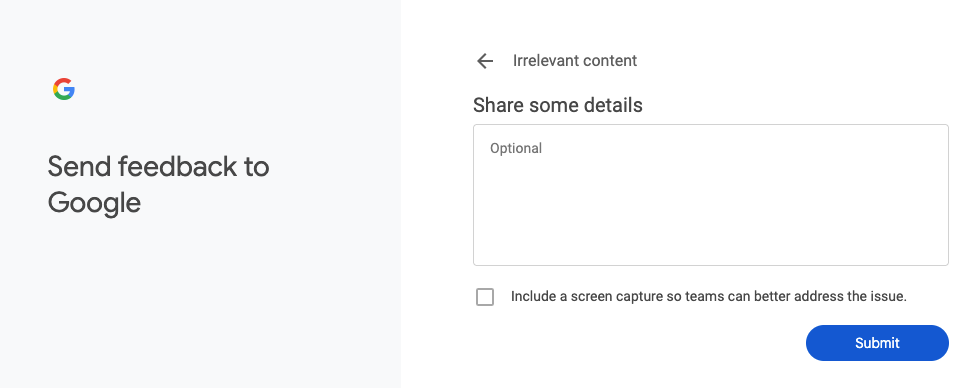
Note that while Google will analyze your request, reporting an autocomplete suggestion doesn’t guarantee that it’ll be removed.
Final Thoughts About Predictive Search Tools

For people and companies that want to build and maintain a solid online reputation, predictive search can be an asset or a liability. Knowing what shows up in predictive search when someone enters your name or company name is an integral part of taking control of your online reputation. Moreover, if there are negative results in predictive search, you have to respond fast so they don’t become a more permanent part of your digital footprint.
At RemoveMugshots.com, we offer removal services to get rid of damaging information online and help you rebuild your personal or professional reputation. Whether you have arrest records, mugshots or police reports that are causing harm, we’ll work on your behalf to remove them from search results.
It doesn’t matter if you were found guilty or if your charges were expunged, dismissed or dropped, either. Our removal strategies will erase or suppress negative content from showing up on mugshot websites and in search engine results.
Give us a call at 844-935-1118 to get started.


